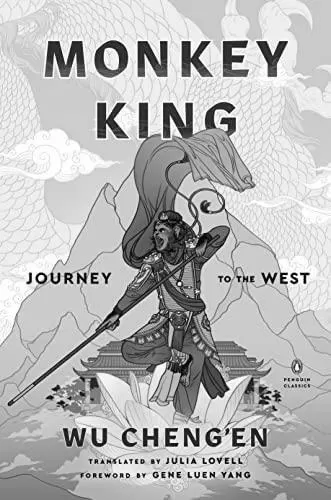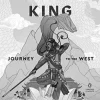Did you know that the Monkey is the deity of Journey To The West? He’s a hero in the movie. But how did he become a deity? In this article, we will take a look at the story and the deity’s role in Chinese mythology.
Monkey is the hero of Journey To The West
Journey to the West, a Chinese myth based on the legendary tale of a monk, the Monkey, is one of the most famous tales in Chinese literature. It is one of the Four Great Novels of China, and was written by Wu Cheng’en in the 16th century. Despite its mythological nature, the story is based on a real historical legend. It follows the journey of a monk named Sanzang on his quest to collect sacred scriptures from Buddha.
The Monkey is one of the most iconic characters in Chinese mythology, as he is a trickster with supernatural powers. In Chinese mythology, he is a hero of many legends and is highly revered. He was born from a magic stone that had sat on a mountain since the beginning of time. The stone was a symbol of life, and the Monkey inherited many of its powers. Monkey was able to carry a staff weighing thirteen thousand pounds, perform a triple somersault, and perform countless other feats.
While in heaven, the Monkey is not subject to the laws of heaven. When he returns to earth, he is captured by Lord Erlang, the nephew of the August Jade Emperor and master of magic. Lord Erlang battles the Monkey through animal transformations to capture him.
The story of the Monkey King is quite intriguing. The Monkey King is born from a magic stone that sits on the Mountain of Flowers and Fruit, where the energies of heaven and earth are impregnated. This magical stone takes centuries to grow, and the Monkey King is conceived from it.
The story is a masterpiece of Chinese literature. It is considered one of the four “Classic Chinese Novels” and is widely known. It has been adapted into movies and television shows year after year. It has had an enormous impact on Chinese culture, influencing the beliefs and practices of many people.
In Chinese mythology, the Monkey is a renowned hero and a powerful warrior. His mighty strength and agility earned him the title of Monkey King. Although his Western equivalents are varied, he is often seen as a blend of Robin Hood, Hellboy, and Shakespeare’s Puck.
The journey of the Monkey King is a popular Chinese story. It has been adapted for film and television and inspired many works of art, including Journey to the West. It is an iconic piece of Chinese mythology, and the story has been translated into many languages.
The story is also popular in Indian mythology. The Monkey King’s origin is believed to be a blend of Chinese and Indian folklore. In the seventh century, the Buddhist monk Xuanzang traveled to India, and the tale of the Monkey King is said to be based on his travels. It is also possible that the Monkey King shares many similarities with the Hindu god Hanuman. It is said that the Monkey King was born from a magical rock that was formed by wind and other elements.
During his journey to the West, the Monkey King met the Goddess Guanyin, the goddess of wisdom and fortune. The Goddess had plotted to have the Monkey King cross paths with Xuanzang. She gave Xuanzang a hair clasp with a special power. The Monkey King had to be tricked into wearing the hair clasp, but in the end, he agreed to travel with him.
Sun Wukong is a student of the Buddho-Daoist sage Subodhi. He is also known as Xuputi, and his name means “monkey who awakens to the void.” He learns the seventy-two methods of earthly transformation, including changing sizes endlessly and avoiding death through internal breathing. His masters also teach him the secret of immortality.
In Chinese mythology, the Monkey King is a godlike creature who is powerful and has superhuman powers. However, he is a selfish creature and has been known to make many mistakes. With sympathetic guidance, the Monkey King is able to turn his destructive nature into a virtue. Ultimately, he achieves Buddhahood.
The Monkey King was born from a rock and was able to absorb holy sprits from the sky. He then made his way to the waterfall and took the form of a monkey. He became a putizushi apprentice and became a powerful monkey king. In a later life, he robbed the dragon’s palace and obtained the Ding Hai Shen Zhen, which was the weapon of choice. In the end, he crossed out his name from the book of mortal lifespan and became immortal.
Monkey is the deity of Journey To The West
In Chinese mythology, the Monkey is the deity of the journey to the west. As the child of the Sun, he is immune to fire, lightning, and edged weapons. However, when he grows up, he becomes a traitor and is sent to hell. The kings of hell attempt to capture him, but he tricks them by stealing the Book of Life and Death. In the process, he erases his own name from the Book of Life and Death, so that they cannot look up his appointed time of death. In fact, when the kings of hell find out about this, they complain to the Jade Emperor.
The Monkey is one of the most popular gods in Chinese mythology. He is also associated with the Xia Dynasty. In the myths, the Monkey can transform into seventy-two shapes, which are the seven basic elements. In addition, he can control the wind and the water. He is also known to be the patron of the arts, and was responsible for the creation of the ancient city of ‘Ciudad Blanca’.
Chinese mythology also combines the Monkey with Buddhist and Taoist beliefs. The Monkey God represents the playful, rebellious side of humankind. He has a natural affinity to fight injustice and to be equal. With the right guidance, the Monkey God can do great things.
The Journey To The West is a great tale with an unlikely hero: the Monkey. This trickster with supernatural powers, the Monkey is an important character in Chinese mythology. His story is the origin of one of the first epic quest narratives in Chinese mythology. The Monkey was born from a magic stone that had been on a mountaintop since the beginning of creation. As a result, he inherited many of the powers that came from this stone, including the ability to lift and hurl 13,000 jin staffs. Eventually, the Monkey could travel 34,000 miles in one somersault.
The Monkey’s adventures in Chinese mythology provide an edifying tour of Chinese mythology. The story’s Chinese characters, the Monkey and his monkey companions, and the characters they encounter, are a mashup of Buddhist, Taoist, and Buddhist elements. The Monkey is the ruler of both Heaven and Earth, but he is not the supreme God. In fact, he is outranked by the three most powerful gods in Chinese mythology.
The Monkey appears in Chinese mythology before Buddhism, and his stories appear in the Chinese Zodiacal beliefs dating as far back as 1100BC. The Monkey is worshipped as the “Great Sage Equal to Heaven,” and the western equivalent of the Monkey is Leo. He is also the trickster god who appears in the 16th-century book Journey to the West. In the story, the Monkey helps a Buddhist monk named Sanzang collect the sacred scriptures from the Buddha. In return, the monk is given the title of Dou Zhan Zheng Fo (Victorious Fighting Buddha).
The Monkey God is one of the most popular figures in Chinese culture, worshipped as a Taoist deity. According to legend, the Monkey God was born from a rock that the goddess Nuwa left behind when she created the universe. As the result, he was conditioned by the elements of nature and was able to create a magical rock.
The Monkey King, also called Sun Wukong, is a powerful god who is considered a god. However, the Monkey King refuses to serve the Dragon King, but eventually changes his mind. In exchange for freedom, the Monkey King is shown a variety of weapons that he can use to fight the dragons. His staff is called the “Jingu Bang,” and it has many powers. He can even shrink his staff to pin-sized. In return, the Dragon King brothers give him a magical armor, a pair of cloud-walking boots, and a phoenix feather cap.
When the travellers finally reached the mountain, the Monkey saw a red cloud in the distance. At first, the Monkey thought that the cloud was a demon. However, it was actually a child of a demon. It was tied to a branch of a tree and continually cried out to passersby. Eventually, the Master couldn’t bear the child’s wails anymore. So, he instructed his disciples to loosen the child’s chains and to carry it on his back.
The Monkey is also considered to be the deity of the journey to the west in Chinese mythology. According to the legend, the Monkey King has a companion, Tang Sanzang, who supervises his journey.







